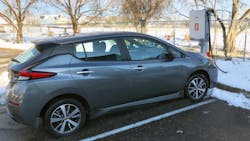Boulder to Explore How EVs Can Reduce Building Energy Costs
The City of Boulder is partnering with Fermata Energy to test the ability to reduce the city's building energy costs with an innovative pilot at the North Boulder Recreation Center.
Typically, electric vehicle (EV) chargers provide energy in one direction — from the energy grid or building to the car. In this new project, the city and Fermata Energy have installed a charging station that enables two-way electricity — from the building to the car and from the car back to the building. This technology, called vehicle-to-building (V2B), can provide the city new ways to manage its energy load and reduce energy costs.
Fermata Energy's bidirectional charging system for EVs allows vehicle batteries to transfer energy from the battery back to a commercial building in order to support the building's electric loads.
In the pilot, Boulder will connect one of its electric fleet vehicles to the V2B charging system, which also connects to the recreation center's electricity system. Fermata Energy will continuously monitor the recreation center's electrical loads. The city will have access to this information and data will be shared via the project website here.
The fleet car will charge at night, when building energy demand is low, and discharge the battery to the recreation center during the day, when the building's demand peaks. The goal is to reduce peak demand which, in turn, can reduce the monthly bill.
"We look forward to testing this new technology and seeing the data to understand the potential of technology like this," said Matt Lehrman, the city's energy strategy adviser. "If we can reduce our peak demand and save money through this project, it might unlock new use cases for expanding the city's EV fleet. Not only can EVs help meet our climate goals and reduce air pollution, but they also might be a strategy to reduce operation costs and enhance resilience."
"Our technology is designed to assist EV owners in saving money, generating revenue, and reducing energy costs," said David Slutzky, founder and CEO of Fermata Energy. "We look forward to supporting the city's efforts to transition to EVs in addition to leveraging EVs to help the city increase its energy resilience and save money with increased EV use."
The city expects to begin receiving data from the pilot in early 2021. Currently, the city owns or leases 21 all-electric vehicles in its fleet and seeks to replace gasoline and diesel vehicles with EVs as vehicles come up for replacement. In September, Boulder City Council adopted the GoEV City resolution, declaring support for transportation electrification across the community and testing innovative EV technology such as this pilot project.
